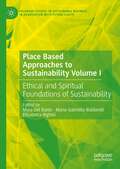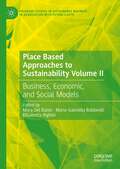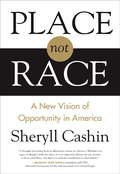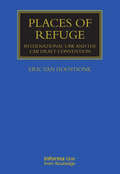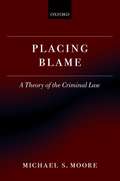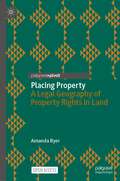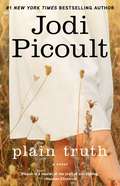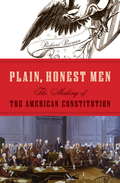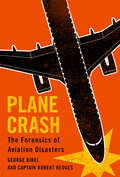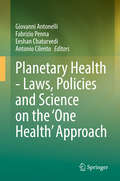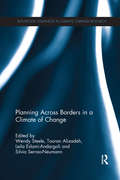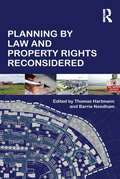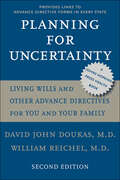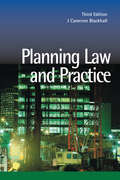- Table View
- List View
Pissing on Demand: Workplace Drug Testing and the Rise of the Detox Industry (Alternative Criminology #18)
by Ken D. TunnellDrug testing has become the norm in many workplaces. In order to get a job, potential employees are required to provide their urine for testing. Pissing on Demand examines this phenomenon along with the resulting rise of the anti-drug testing movement, or the "detox industry," that works to beat these tests. Strategies include over-the-counter products like "body flushers" that sound innocent but are really designed to mask the presence of illegal drugs to kits advertised in pro-drug publications like High Times that make no bones about their real purpose. The first exposé of the detox industry in all its manifestations, this book is required reading for anyone concerned with social control, privacy, and workers' rights.
Place Based Approaches to Sustainability Volume I: Ethical and Spiritual Foundations of Sustainability (Palgrave Studies in Sustainable Business In Association with Future Earth)
by Maria-Gabriella Baldarelli Mara Del Baldo Elisabetta RighiniWithout respecting and nurturing ‘place’ we cannot achieve a state of ecological sustainability. Place-based organizations are not run on a purely materialistic basis. The non-materialistic features of a place, its aesthetics, cultural heritage, community feelings, transcendence, should be integrated into sustainability management. This far-reaching two-volume work breaks with the economic logic of efficiency and profit maximization, and suggests that organizations should inform their sustainability by encompassing feelings of identity with and attachment to place.According to this vision, the editors have compiled scholarly contributions aimed to support the ecological transformation of humankind by exploring both theoretical and practical models that integrate the sense of the place, ethics and spirituality in new ways of organizing of economic and social life. This first volume sets the theoretical direction of the volumes, asking broad aesthetic questions around the ethical and spiritual foundations of sustainability. It will be of interest to scholars, practitioners and students of sustainability, business ethics and spirituality.
Place Based Approaches to Sustainability Volume II: Business, Economic, and Social Models (Palgrave Studies in Sustainable Business In Association with Future Earth)
by Maria-Gabriella Baldarelli Mara Del Baldo Elisabetta RighiniWithout respecting and nurturing ‘place’ we cannot achieve a state of ecological sustainability. Place-based organizations are not run on a purely materialistic basis. The non-materialistic features of a place, its aesthetics, cultural heritage, community feelings, transcendence, should be integrated into sustainability management. This far-reaching two-volume work breaks with the economic logic of efficiency and profit maximization, and suggests that organizations should inform their sustainability by encompassing feelings of identity with and attachment to place.According to this vision, the editors have compiled scholarly contributions aimed to support the ecological transformation of humankind by exploring both theoretical and practical models that integrate the sense of the place, ethics and spirituality in new ways of organizing of economic and social life. This second volume takes the theoretical direction, established in the first model, and puts it into practice withcases from business and society. It will be of interest to scholars, practitioners and students of sustainability, business ethics and spirituality.
Place, Not Race
by Sheryll CashinFrom a nationally recognized expert, a fresh and original argument for bettering affirmative action Race-based affirmative action had been declining as a factor in university admissions even before the recent spate of related cases arrived at the Supreme Court. Since Ward Connerly kickstarted a state-by-state political mobilization against affirmative action in the mid-1990s, the percentage of four-year public colleges that consider racial or ethnic status in admissions has fallen from 60 percent to 35 percent. Only 45 percent of private colleges still explicitly consider race, with elite schools more likely to do so, although they too have retreated. For law professor and civil rights activist Sheryll Cashin, this isn't entirely bad news, because as she argues, affirmative action as currently practiced does little to help disadvantaged people. The truly disadvantaged--black and brown children trapped in high-poverty environs--are not getting the quality schooling they need in part because backlash and wedge politics undermine any possibility for common-sense public policies. Using place instead of race in diversity programming, she writes, will better amend the structural disadvantages endured by many children of color, while enhancing the possibility that we might one day move past the racial resentment that affirmative action engenders. In Place, Not Race, Cashin reimagines affirmative action and champions place-based policies, arguing that college applicants who have thrived despite exposure to neighborhood or school poverty are deserving of special consideration. Those blessed to have come of age in poverty-free havens are not. Sixty years since the historic decision, we're undoubtedly far from meeting the promise of Brown v. Board of Education, but Cashin offers a new framework for true inclusion for the millions of children who live separate and unequal lives. Her proposals include making standardized tests optional, replacing merit-based financial aid with need-based financial aid, and recruiting high-achieving students from overlooked places, among other steps that encourage cross-racial alliances and social mobility. A call for action toward the long overdue promise of equality, Place, Not Race persuasively shows how the social costs of racial preferences actually outweigh any of the marginal benefits when effective race-neutral alternatives are available.From the Hardcover edition.
Placebo Effects: The Meaning of Care in Medicine (The International Library of Bioethics #81)
by Pekka LouhialaThis book provides a perspective on the concepts placebo and placebo effects, which has been missing so far: a detailed analysis of the history of the terms, their current use, suggested alternatives and the implications of the conceptual confusion. Everybody knows something about placebos and placebo effects. If, however, people are asked to define the concepts, the spectrum becomes wide. Does 'placebo' refer to an inert treatment or does it cover all elements of the patient-physician-interaction except for pharmacological or other physiological mechanisms? Furthermore, if, by definition, a placebo has no effect, what sense does it make to talk about a 'placebo effect'? Even in scientific literature the concepts ‘placebo’ and ‘placebo effect’ are used in many senses and often in a confusing way. While this book discusses many issues which keep puzzling physicians, it also covers the historical developments of the concepts of placebo and placebo effect as well as the conceptual confusion in the definitions. This book is intended for physicians, philosophers, psychologists and any other people interested in placebos, placebo effects and the physician-patient relationship.
Places of Refuge
by Eric Van HooydonkThe need for specific legal arrangements governing ships in distress and places of refuge is one of the most topical problems in both public and private maritime law. The headline grabbing shipping disasters involving the loss of the Erika (1999) and the Prestige (2002) attracted the attention of the IMO, the Comité Maritime International, the European Union, national maritime authorities around the globe and the maritime industry in general. Ultimately the impact of pollution on local economies and the environment was enough to arouse the concern of a broad swathe of public opinion. Places of Refuge provides clarity on: • The scope of the right of access • The conditions under which coastal authorities may deny access • The liability of authorities granting or denying access • The basis and the conditions of financial securities • The obligation to establish contingency plans
Placing Blame: A General Theory of the Criminal Law
by Michael MooreThis is a collection of essays written by Moore which form a thorough examination of the theory of criminal responsibility. The author covers a wide range of topics, giving the book a coherence and unity which is rare in assembled essays. Perhaps the most significant feature of this book is Moore's espousal of a retributivist theory of punishment. This anti-utilitarian standpoint is a common thread throughout the book. It is also a trend which is currently manifesting itself in all areas of moral, political and legal philosophy, but Moore is one of the first to apply such attitudes so sytematically to criminal law theory. As such, this innovative, new book will be of great interest to all scholars in this field.
Placing Property: A Legal Geography of Property Rights in Land (Palgrave Socio-Legal Studies)
by Amanda ByerThis open access book presents a legal geography of property rights in land through the lenses of landscape and critical spatial justice. It seeks to reassert the importance of landscape and place in property as an alternative to abstract concepts of property which dominate contemporary thinking. It investigates property’s origins and uptake in the common law through the lenses of landscape and spatial justice, providing a genealogy of property, from its early origins in pre-feudal Scandinavia to its development as a cornerstone concept in English common law. It offers a new perspective and analytical tools to reconsider many accepted approaches to land in the law today. This book also contributes both to the decolonization of property law and critiques of property’s unsustainability, as well as the examination of the role of law itself in facilitating large scale land changes that destroy place, and the ramifications of this process. As such, it should be of interest to inter-disciplinary scholars working in the socio-legal, environmental and property law fields
Plain English For Lawyers (Fifth Edition)
by Richard C. WydickWydick's Plain English for Lawyers--now in its fifth edition--has been a favorite of law students, legal writing teachers, lawyers, and judges for over 25 years. How does the fifth edition of Plain English for Lawyers differ from its predecessors? It remains (in size only!) a little book, small enough and palatable enough not to intimidate over-loaded law students. 'Most of the text remains the same,' Wydick says, 'but in the past seven years I ve learned some new things about writing in English, and I want to share that with the readers.' In addition, the exercises at the end of the chapters are different (a welcome change for long-time teachers who are tired of the old ones). Finally, the teacher's manual includes additional exercises that teachers can give to students who want or need extra practice.
Plain English for Lawyers
by Richard C. Wydick Amy E. SloanPlain English for Lawyers has been a favorite of law students, legal writing teachers, lawyers, and judges for almost 40 years. The sixth edition, now co-authored by Amy Sloan, updates this classic text, including new chapter exercises, while preserving all the approaches that make it such a standard in the field. It remains (in size only!) a little book, small enough and palatable enough not to intimidate over-loaded law students. <P><P> In January 2005, the Legal Writing Institute gave Wydick its Golden Pen Award for having written Plain English for Lawyers. The Legal Writing Institute is a non-profit organization that provides a forum for discussion and scholarship about legal writing, analysis, and research. The Institute has over 1,300 members representing all of the ABA-accredited law schools in the United States. Its membership also includes law teachers from other nations, English teachers, and practicing lawyers. <P><P> The LWI award states: Plain English for Lawyers ... has become a classic. Perhaps no single work has done more to improve the writing of lawyers and law students and to promote the modern trend toward a clear, plain style of legal writing.
Plain Truth: A Novel
by Jodi PicoultJodi Picoult has touched readers deeply with her acclaimed novels, such as Keeping Faith and The Pact. Gifted with "a remarkable ability to make us share her characters' feelings" (People), Picoult now explores the complex choices of the heart for a young Amish woman -- the compelling journey of discovery for an urban lawyer who befriends and protects her. The small town of Paradise, Pennsylvania, is a jewel in Lancaster County -- known for its picture-postcard landscapes and bucolic lifestyle. But that peace is shattered by the discovery of a dead infant in the barn of an Amish farmer. A police investigation quickly leads to two startling disclosures: the newborn's mother is an unmarried Amish woman, eighteen-year-old Katie Fisher. And the infant did not die of natural causes. Although Katie denies the medical proof that she gave birth to the child, circumstantial evidence leads to her arrest for the murder of her baby. One hundred miles away, Philadelphia defense attorney Ellie Hathaway has achieved an enviable, high-profile career. But her latest court "victory" has set the sands shifting beneath her. Single at thirty-nine and unsatisfied with her relationship, Ellie doesn't look back when she turns down her chance to make partner and takes off for an open-ended stay at her great-aunt's home in Paradise. Fate brings her to Katie Fisher. Suddenly, Ellie sees the chance to defend a client who truly needs her, not just one who can afford her. But taking on this case challenges Ellie in more ways than one. She finds herself not only in a clash of wills with a client who does not want to be defended but also in a clash of cultures with a people whose channels of justice are markedly different from her own. Immersing herself in Katie Fisher's life -- and in a world founded on faith, humility, duty, and honesty -- Ellie begins to understand the pressures and sacrifices of those who to live "plain." As she peels away the layers of fact and fantasy, Ellie calls on an old friend for guidance. Now, just as this man from Ellie's past reenters her life, she must uncover the truth about a complex case, a tragic loss, the bonds of love -- and her own deepest fears and desires. Moving seamlessly from psychological drama to courtroom suspense, Plain Truth is a triumph of contemporary storytelling. Jodi Picoult presents a fascinating portrait of Amish life rarely witnessed by those outside the faith -- and discovers a place where circumstances are not always what they seem, where love meets falsehood, and where relationships grow strong enough to span two worlds.
Plain, Honest Men: The Making of the American Constitution
by Richard BeemanIn May 1787, in an atmosphere of crisis, delegates met in Philadelphia to design a radically new form of government. Distinguished historian Richard Beeman captures as never before the dynamic of the debate and the characters of the men who labored that historic summer. Virtually all of the issues in dispute--the extent of presidential power, the nature of federalism, and, most explosive of all, the role of slavery--have continued to provoke conflict throughout our nation's history. This unprecedented book takes readers behind the scenes to show how the world's most enduring constitution was forged through conflict, compromise, and fragile consensus. As Gouverneur Morris, delegate of Pennsylvania, noted: "While some have boasted it as a work from Heaven, others have given it a less righteous origin. I have many reasons to believe that it is the work of plain, honest men."
Plaintiff in Chief: A Portrait of Donald Trump in 3500 Lawsuits
by James D. ZirinA comprehensive analysis of Donald Trump's legal history reveals his temperament, methods, character, and morality. Unlike all previous presidents who held distinguished positions in government or the military prior to entering office, Donald Trump's political worldview was molded in the courtroom. He sees law not as a system of rules to be obeyed and ethical ideals to be respected, but as a weapon to be used against his adversaries or a hurdle to be sidestepped when it gets in his way. He has weaponized the justice system throughout his career, and he has continued to use these backhanded tactics as Plaintiff in Chief.In this book, distinguished New York attorney James D. Zirin presents Trump's lengthy litigation history as an indication of his character and morality, and his findings are chilling: if you partner with Donald Trump, you will probably wind up litigating with him. If you enroll in his university or buy one of his apartments, chances are you will want your money back. If you are a woman and you get too close to him, you may need to watch your back. If you try to sue him, he's likely to defame you. If you make a deal with him, you had better get it in writing. If you are a lawyer, an architect, or even his dentist, you'd better get paid up front. If you venture an opinion that publicly criticizes him, you may be sued for libel.A window into the president's dark legal history, Plaintiff in Chief is as informative as it is disturbing.
Plan Your Estate
by Denis CliffordStraightforward, plain English explanations of every significant estate planning option available, all in easy to understand language. Nolo's bestseller Plan Your Estate shows how to: . avoid probate . leave property through a will or trust . use life insurance to provide for your loved ones . name a guardian for children . leave property to a young person . plan for incapacity . implement strategies specific to business owners . reduce estate taxes . make final arrangements The 12th edition is completely revised with the latest federal and state laws, including updated information about estate and gift taxes and how recent changes in the law affect estate planning for same sex spouses.
Plan Your Estate
by Denis CliffordTurn to Plan Your Estate for straightforward, plain-English explanations of each of your estate-planning options, so you can make the best decisions for you and those you love. Attorney Denis Clifford shows you how to: avoid probate leave property through a will or trust use life insurance to provide for your loved ones name a guardian for your minor children leave property to a young person plan for incapacity implement strategies specific to business owners reduce estate taxes, and make final arrangements. Applies in all U.S. states except Louisiana.
Plan Your Estate
by Denis CliffordProtect your family with solid estate planning Estate planning sounds difficult—but most people just need a few basic documents. Let Plan Your Estate show you how to protect your loved ones from legal hassles and financial uncertainty after your death. Learn about: wills and living trusts avoiding probate bypass (AB) trusts naming guardians for children leaving property to children estate, gift, and inheritance taxes strategies for business owners leaving property to charity health care directives, and financial powers of attorney. The 15th edition of Plan Your Estate is completely updated to reflect the latest state and federal laws. Applies in all U.S. states except Louisiana. (Note: This book contains no estate planning forms, but it does tell you how to get the forms you need.)
Plan Your Estate
by Denis Clifford AttorneyWhen you're thinking about estate planning, you want to make sure that you choose the right plan for your family. Turn to Plan Your Estate, Nolo's bestselling book of estate planning essentials. Get straightforward, plain-English explanations of every significant estate-planning option available, so you can make the best decisions for you and those you love. Let Nolo's bestseller Plan Your Estate show you how to: . avoid probate . leave property through a will or trust . use life insurance to provide for your loved ones . name a guardian for your minor child . leave property to a young person . plan for incapacity . implement strategies specific to business owners . reduce estate taxes . make final arrangements This edition is completely revised with the latest federal and state laws, plus updated estate and gift tax information, and enhanced discussions about 529 plans, same-sex marriage, tax-saving trusts, and retirement benefits.
Plan Your Own Estate: Passing on Your Assets and Your Values Legally and Efficiently
by Deirdre R. Wheatley-LissPlan Your Own Estate: Passing on Your Assets and Your Values Legally and Efficiently takes a straightforward and engaging “you”-oriented approach to dealing with one of life’s certainties--death. While you "can’t take it with you," this book empowers you to decide how your assets can best help your family when you are gone. Experienced attorney Deirdre R. Wheatley-Liss concentrates into this book the experience she's had helping hundreds of families work through their estate plans. Whether you have modest or extensive assets, Plan Your Own Estate provides the knowledge you need to design your plan and the tools you need to move forward.<P><P> The starting place is your goals. Part 1 of the book asks, "What do you want to accomplish for yourself and your family?" The next step depends on you. Are you looking to educate yourself about how a will or trust is structured, or how tax law works? Part 2, Resource Guides, breaks down tough topics like these and delivers actionable information. Have questions about what your estate plan should say? Part 3, Planning Guides, goes through an attorney’s analysis in considering the most frequently asked estate planning questions. Thinking about creating your own estate plan, or hiring an attorney? Part 4, Action Guides, helps you start your estate plan and make sure it’s complete, or review any plan you may already have in place. <P> Nobody likes talking about death, taxes, or disability--but not thinking about them will not make them go away. Plan Your Own Estate will help you make a plan, put it in place, and take control of how your money and your values are being passed to your family. This book includes:<P> * Comprehensive “plain English” coverage of every aspect of planning your estate<P> * Methods to protect your loved ones' inheritance from taxes, immaturity, lack of financial knowledge, incapacity, creditors, and predators<P> * Planning guides for families with children, singles, second marriages, business owners, unmarried or same-sex couples, and more<P> * Up-to-date information regarding changing laws and best practices<P> What you’ll learn:<P> Through this book, you will be able to:<P> * Create an estate plan that meets your goals, clearly communicates your intentions, and reduces the chance of family fighting when you are gone.<P> * Gain the insight of an attorney’s thought processes, both legal and practical, and how to apply them to your personal situation.<P> * Understand the structure of the documents at the heart of estate planning: wills, trusts, power of attorney, health care power, and other transfer devices designed to pass assets to your beneficiaries more easily.<P> * Decipher tax laws to incorporate provisions in your estate plan to reduce or eliminate taxes, and deal with a changing tax code.<P> * Master complicated legal terms and concepts.<P> * Understand the probate process and its alternatives.<P> Who this book is for: <P> Plan your Own Estate is for anyone who wants to preserve the value of assets and leave them to beneficiaries in the most efficient manner. The book is for married couples with children and grandchildren, singles, unmarried couples, non-citizens, and same-sex couples. It teaches readers how to reduce or eliminate the government as a beneficiary by taking advantage of tax-reduction strategies. No matter your marital status or wealth, Plan your Own Estate empowers you to achieve financial security for loved ones and other beneficiaries.
Plane Crash: The Forensics of Aviation Disasters
by George Bibel Captain Robert HedgesMelding a pilot’s practical view of life in the cockpit with the expertise of an engineering professor to give readers an insider look at plane crashes.One of the most amazing feats of modern life is the frequency with which airplanes safely take off and land: about 40,000 times a day in the United States alone. Commercial aviation is by far the safest mode of transportation and is becoming safer all the time. But on the exceedingly rare occasion that a plane does crash, comprehensive accident analysis, thorough investigation, and implementation of remedial actions significantly reduces the probability of an already remote event ever recurring.Plane Crash, an unprecedented collaboration between mechanical engineering professor George Bibel and airline Captain Robert Hedges, shares the riveting stories of both high-profile and lesser-known airplane accidents. Drawing on accident reports, eyewitness accounts, and simple diagrams to explain what went wrong in the plane and in the cockpit, Hedges provides invaluable insight into aviation human factors, while Bibel analyzes mechanical failures. No prior scientific knowledge is needed to understand the principles and procedures this book describes, only an interest in the view from what Captain Hedges describes as "the best seat in the house."Organized around the phases of flight—takeoff, climb, cruise, approach, and landing—this book is a captivating look at some of the most dramatic plane crashes of the modern age, including Asiana Airlines 214, Air France 447, and Malaysia Airlines 370. If you have ever wondered what goes through a pilot’s mind as a flight takes a turn for the dangerous, what impact turbulence actually has on flight safety, or even just how the wonders of aeronautics work to keep passengers safe day in and out, Plane Crash will both fascinate and educate.
Planet Ocean
by Paul Watson Jan DutkiewiczVeteran environmental activist and Whale Wars host Paul Watson offers in this interview a provocative and revolutionary view of the state of an environment in crisis. The planet may survive our environmental destruction, he argues, but humans may not. Focused on protecting oceans, preventing the loss of biodiversity, and promoting individual action, Watson's singular call to arms challenges the typical talking points of the modern environmental movement.
Planetary Health - Laws, Policies and Science on the 'One Health' Approach
by Giovanni Antonelli Fabrizio Penna Eeshan Chaturvedi Antonio CilentoThis book offers a multidisciplinary and in-depth analysis of the One Health approach. The holistic One Health vision, a healthcare model based on the integration of various disciplines, is both ancient and current. It is based on the recognition that human health, animal health and ecosystem health are inextricably linked. Cognizant of the need for multidisciplinary research to address complex health challenges at the national and international level, the book combines legal, public policy and medical perspectives on the One Health approach, exploring e.g. the role of biodiversity, human rights, trade agreements, indigenous knowledge, and climate change mitigation and adaptation. One Health is officially recognized by the European Commission and by a host of international organizations as a relevant strategy for actors in all sectors that benefit from collaboration between disciplines (doctors, veterinarians, lawyers, environmentalists, economists, sociologists etc.). One Health is an ideal approach to achieving global health, as it addresses the needs of the most vulnerable populations based on the intimate relationship between their own health, that of their animals, and that of the environment in which they live, considering the wide spectrum of determinants that emerge from this relationship. Given its scope, the book will be of interest to academics, professionals, and students of all disciplines who engage with the One Health approach.
Planning Across Borders in a Climate of Change (Routledge Advances in Climate Change Research)
by Wendy Steele Silvia Serrao-Neumann Tooran Alizadeh Leila Eslami-AndargoliThe fixity or mobility of borders are key themes within the border studies literature and have useful critical application to urban and environmental planning through theory, pedagogy and practice. This offers potential for transformative change through the processes of re-bordering and re-orienting established boundary demarcations in ways that support and promote sustainability in a climate of change. Planning Across Borders in a Climate of Change draws on a range of diverse case studies from Australasia, North and South America, Europe, Africa, the Middle East and Asia and offers the application of border theory, concepts and principles to planning as a critical lens. It applies this lens to a range of international case studies in key areas such as climate change adaptation, food security, spatial planning, critical infrastructure and urban ecology. This collection fills an important gap in the border studies literature, bringing climate change considerations to bear on planning. It should be of interest to students, scholars and professionals in the field of urban and environmental planning, climate change adaptation, border studies, urban studies, human and political geography, environmental studies and development.
Planning By Law and Property Rights Reconsidered
by Barrie Needham Thomas HartmannCountries which take spatial planning seriously should take planning law and property rights also seriously. There is an unavoidable logical relationship between planning, law, and property rights. However, planning by law and property rights is so familiar and taken for granted that we do not think about the theory behind it. As a result, we do not think abstractly about its strengths and weaknesses, about what can be achieved with it and what not, how it can be improved, how it could be complemented. Such reflections are essential to cope with current and future challenges to spatial planning. This book makes the (often implicit) theory behind planning by law and property rights explicit and relates it to those challenges. It starts by setting out what is understood by planning by law and property rights, and investigates - theoretically and by game simulation - the relationships between planning law and property rights. It then places planning law and property rights within their institutional setting at three different scales: when a country undergoes enormous social and political change, when there is fundamental political debate about the power of the state within a country, and when a country changes its legislation in response to European policy. Not only changing institutions, but also global environmental change, pose huge challenges for spatial planning. The book discusses how planning by law and property rights can respond to those challenges: by adaptive planning), by adaptable property rights, and by public policies at the appropriate geographical level. Planning by law and property rights can fix a local regime of property rights which turns out to be inappropriate but difficult to change. It questions whether such regimes can be changed and whether planning agencies can make such undesirable lock-ins less likely by reducing market uncertainty and, if so, by what means.
Planning For Uncertainty: Living Wills and Other Advance Directives for You and Your Family (A Johns Hopkins Press Health Book)
by William Reichel David John DoukasA practical guide to documenting your decisions and preferences in case of incapacitating illness.It won’t happen to me.I’m too busy to worry about a living will.My family will know what to do.No one wants to plan for incapacitating illness or death. But to spare loved ones from needless emotional suffering, or even legal battles, people of all ages need to document and communicate clear decisions about the final details of their lives while they are healthy and have time to fully consider their own values and preferences.Here, Drs. David Doukas and William Reichel help individuals make decisions and communicate their wishes to health care providers and family members and other loved ones. They use a question-and-answer format to guide readers through the process—emphasizing the crucial connection between values and treatment preferences. They explain advance directives and the health care decision-making process, including the values history, family covenants, proxies, and proxy negation. The appendix includes resources and web links for learning about advance directive requirements and obtaining legal forms in all fifty states.This practical guide helps people navigate the intimidating but important process of thinking about, and planning for, an uncertain future.
Planning Law and Practice
by J. Cameron BlackhallThe law relating to town and country planning has a major impact upon the physical environment and affects private citizens, landowners and developers alike. This third edition is a comprehensive text for students, practitioners and members of the general public on this difficult area of law. Following the Planning and Compulsory Purchase Act 2004, the third edition of Planning Law and Practice contains a complete revision of plan-making and the control of development as well as incorporating recent case law. Together this provides up-to-date details of the operation of the current English planning system. The successful format adopted in the first edition of this book, which was awarded the Gold Award for Best Reference Work by the Chartered Institute of Building in 1999, has been retained. Planning legislation is dealt with in the main chapters, while further chapters use relevant case law to amplify the sometimes complex statutory material. In addition, the book outlines other areas of land law such as European legislation, non-planning controls and public investment.

